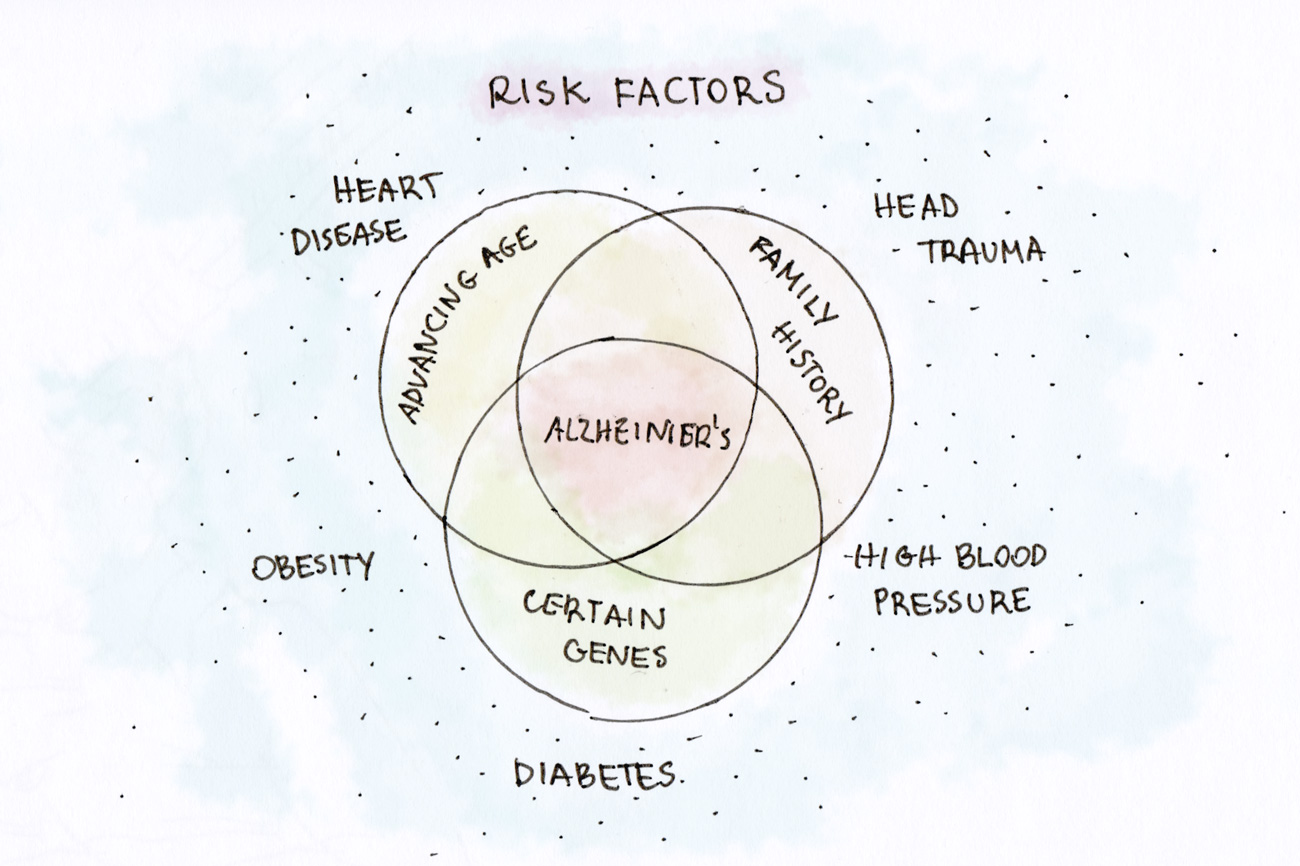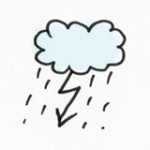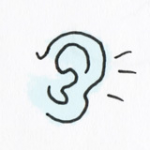Alzheimer’s Disease: Everyone with a Brain is at Risk!

Alzheimer’s disease is a form of dementia that causes a progressive, irreversible decline in an individual’s normal patterns of behavior, thinking, and memory. It can progress to the point that the ability to perform daily tasks is compromised, and it is deadly. Although it predominantly affects those 65 or older, it is not considered a normal part of aging.
Essentially, everyone with a brain is at risk for developing this incurable disease, which affects more than 5 million people and is the sixth leading cause of death in the United States. Some studies suggest that, among older people, it is the third leading cause of death, eclipsed only by heart disease and cancer. Currently, there is no cure for this disease, which kills more people than breast and prostate cancer combined. However, research is ongoing, and there are some treatments that can slow the progression of the disease.
Changes in the Brain and Risk Factors
In people with Alzheimer’s, damage to the brain may start 10 years or more before memory and cognition are affected. At that stage, they may be free of symptoms, but toxic changes are taking place in the brain, namely abnormal deposits of proteins that form amyloid plaques and tangled bundles of fibers called tau tangles. These changes cause disruptions in connections between neurons, the nerve cells of the brain.
Thus far, studies have shown that the most prevalent risks for developing Alzheimer’s include advancing age, a strong family history of the disease (affecting a parent, child, or sibling), and the presence of certain genes. All of these are factors that you cannot control.
However, a host of other factors may also be at play. For instance, scientists are now studying the relationship between cognitive decline and head trauma, as well as certain vascular and metabolic conditions, such as high blood pressure, heart disease, obesity, and diabetes. Reducing the risk of these conditions may have a beneficial effect on your risk of developing Alzheimer’s.
Additionally, observing the guidelines for general healthy aging may offer protection against developing the disease. Your risk may be reduced by maintaining healthy eating habits, exercising, and engaging in stimulating mental and social activities.
Signs and Symptoms of Alzheimer’s Disease
The 10 most common signs of Alzheimer’s are listed in the box below. Its progression is variable, but in the early stages of the disease, mild memory loss is most common. As the disease progresses, affected individuals may withdraw, becoming disoriented, unresponsive to their environment, and unable or unwilling to interact with the people in their lives. In advanced stages, they may even have difficulty walking, speaking, or swallowing.
10 Most Common Signs and Symptoms of Alzheimer’s Disease
- Memory loss, especially the inability to recall recently learned information
- Difficulty concentrating or solving problems
- Trouble completing familiar tasks
- Mood swings and personality changes
- Confusion about time, place, or events and unfounded suspicions about family members, friends, or caregivers
- Trouble recalling words and following or participating in conversations
- Impaired ability to interpret visual or spatial cues
- Altered judgment, which sometimes leads to risky behaviors
- Withdrawal from previously pleasurable activities or social situations
- Misplacing objects and difficulty performing activities with sequential steps
Since early diagnosis provides the best opportunity for treatment and planning for the future, it is important to see a doctor if you or someone you know is exhibiting these signs. There is no single test that can definitively diagnose Alzheimer’s. Rather, the doctor will assess the individual’s overall health status, any history of past medical issues or changes in personality or behavior, and the person’s ability to perform daily activities. Cognitive and neurological testing, standard medical tests like blood and urine analysis, and brain scans may also be performed to detect abnormalities and rule out other causes of the problem.
Treatment
To date, no cure has been discovered for Alzheimer’s, but there are some drugs and other treatments that may slow the course of the disease, alleviate some of the behavioral and cognitive symptoms, and improve quality of life. The U.S. Food and Drug Administration has approved several medications for the treatment of Alzheimer’s. These drugs don’t alter the disease process, but by regulating neurotransmitters in the brain, they may help reduce or delay cognitive decline and behavioral problems, at least for a time. Non-drug strategies for treating Alzheimer’s, such as exercise, can also be effective in improving cognitive function or slowing progression of the disease.
Coping Mechanisms for Caregivers
Alzheimer’s disease places high physical, emotional, and financial demands on caregivers. Daily care, changes in family roles, insufficient support, and concern over the safety and well-being of a loved one take a tremendous toll. Becoming well-informed about the disease, practicing self-care, and seeking support when needed are all important strategies for coping.
Often, the behavioral changes that can occur with Alzheimer’s are the most distressing for patient and caregiver alike. Those affected may be agitated, anxious, depressed, restless, or aggressive; exhibit emotional or verbal outbursts; or experience sleeplessness, hallucinations, or wandering, among other behaviors. It may be difficult for caregivers not to take such behaviors personally. There are some strategies that can help, though:

 Assess personal comfort. This is particularly important if the person with Alzheimer’s has difficulty with communication. The behavior may be a result of pain, thirst, hunger, fatigue, infection, or other cause unrelated to Alzheimer’s.
Assess personal comfort. This is particularly important if the person with Alzheimer’s has difficulty with communication. The behavior may be a result of pain, thirst, hunger, fatigue, infection, or other cause unrelated to Alzheimer’s.
 Avoid confrontation. For instance, if a family member with Alzheimer’s insists that her deceased brother visited her last week, don’t argue. Redirect the conversation, perhaps bringing up an endearing trait of the brother or memories of an enjoyable visit with him.
Avoid confrontation. For instance, if a family member with Alzheimer’s insists that her deceased brother visited her last week, don’t argue. Redirect the conversation, perhaps bringing up an endearing trait of the brother or memories of an enjoyable visit with him.

 Allow adequate rest. Sleep patterns can be disrupted in those with Alzheimer’s, and they may be prone to overstimulation throughout the day, so it’s important to provide them with ample opportunities to rest and relax.
Allow adequate rest. Sleep patterns can be disrupted in those with Alzheimer’s, and they may be prone to overstimulation throughout the day, so it’s important to provide them with ample opportunities to rest and relax.
 Don’t ignore requests, even if inappropriate. It is best to acknowledge the request and respond, even if you cannot fulfill the person’s desires.
Don’t ignore requests, even if inappropriate. It is best to acknowledge the request and respond, even if you cannot fulfill the person’s desires.

Help is also available from other organizations, like the Alzheimer’s Disease Education and Referral (ADEAR) Center, the Alzheimer’s Foundation of America, and the Family Caregiver Alliance, to name a few. Also, many organizations, like the Northeastern New York chapter of the Alzheimer’s Association, host events to raise awareness and funding for research into the disease. Your involvement and advocacy could help you overcome any feelings of helplessness you are experiencing.
 The Daily Dose
The Daily Dose
Comments are closed.